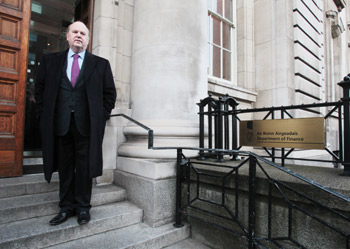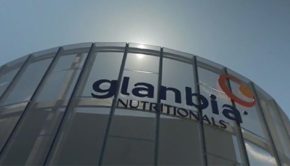VAT increase postpones the hard choices

The new increased VAT rate will not solve the government’s financial difficulties but will merely further affect consumer confidence, writes Dan White
16 January 2012
The much worse-than-expected full-year exchequer returns, particularly the €489m shortfall in VAT receipts, raises serious doubts about the central plank of the government’s 2012 budget strategy. It now looks increasingly likely that the 2% VAT increase will not deliver the €670m revenue boost which the government is targeting.
The December 2011 budget was an inelegant political fudge. Fine Gael was determined to stick to its pre-election promise not to either raise income tax rates or narrow tax credits and bands. Meanwhile the other half of the coalition was equally determined that it wouldn’t cross its “red lines” with Labour adamant that there would be no cuts in either headline social welfare rates or public sector pay.
With the immovable political force having met the immovable object, the only plausible compromise was the decision to raise the VAT rate by 2% at the beginning of 2012 rather than the 1% increase in 2013 followed by a further 1% increase in 2014 which was projected in the previous government’s four-year budgetary plan.
Budget 2012 a mess
Starting with its two-headed presentation, with Public Expenditure Minister Brendan Howlin detailing the spending cuts on Monday, 5 December and Finance Minister Michael Noonan following up with the tax increases the following day, Budget 2012 has been a mess. With neither of the coalition parties prepared to compromise we have ended up with the worst of all possible worlds.
Even when Michael Noonan confirmed the 2% VAT rate increase on 6 December there were many who doubted that it would raise the €670m of extra revenue in 2012 that the government was hoping for. These doubts were apparently confirmed
when the government published the full-year 2011 exchequer returns just four months later.
These showed that, not alone had overall tax revenues come in €873m below target but that VAT revenues, which were €4,809m below target, were the main contributor to the shortfall. It was only the €2.5bn jump in income tax receipts due to the imposition of the universal social charge at the beginning of 2011 that kept the public finances more or less on track last year.
Pinning hopes on VAT revenue
This year the government is pinning its hopes on the VAT rise to generate almost two-thirds of the extra €1.1bn of revenue it has targeted for 2012. But will it? It might not be a good idea to bet on it. Since peaking in 2007 the value of Irish retail sales has fallen by almost a quarter. That fall continued into 2011 with the most recent CSO figures showing a further 0.7% decrease in the 12 months to the end of November 2011.
It is this continuing fall in the value of retail sales which resulted in the disappointing 2011 VAT receipts. And the government hopes that a 2% increase in the VAT rate will boost revenue. Am I alone in wondering if this is being excessively optimistic? Far more likely is that the VAT increase will further undermine already weak consumer confidence and persuade shoppers, not that they require much persuasion in the current climate, to keep their hands in their pockets.
Let the VAT returns watching begin!
With the exchequer returns being published a few days after the end of every month any shortfall in VAT or other tax revenues will become apparent very quickly. While the November and December 2011 numbers were artificially boosted by comparison with the same months of 2010 when many shoppers were confined to their homes by the Arctic weather conditions, the January and February 2012 numbers will be closely watched to see if the VAT rate increase is coming anywhere near generating the expected revenue growth.
The omens are not encouraging. Not alone is consumer confidence at close to an all-time low, we have been here before. In his first budget in October 2009 the late Brian Lenihan raised the standard VAT rate by just 0.5% to 21.5%. The move was not a success and the former Finance Minister was forced to execute a humiliating u-turn just over a year later.
Of course it could be argued that Brian Lenihan was unlucky in his timing. His decision to increase the Irish VAT rate came just as former UK Chancellor Alistair Darling temporarily cut the UK VAT rate from 17.5% to just 15%. This widening of the UK-Irish VAT gap to an unprecedented 6.5% came at the same time as the value of sterling collapsed on the foreign exchange markets. The result was a tsunami of southern shoppers heading to Newry and points further north.
There are significant differences this time around. Darling’s successor George Osborne increased the UK VAT rate to 20% in 2010 and sterling has recently strengthened against the euro. This means that, even after the most recent Irish VAT rate increase, the cross-border VAT gap is still only 3%. Michael Noonan is clearly hoping that the weakening of the euro and the narrowing of the VAT gap will keep the cross-border leakage of shoppers within manageable bounds.
Consumers still postponing buying big items
He may well be right. But whether that translates into higher VAT receipts to the Irish exchequer is another matter entirely. Far more likely is that southern shoppers, already traumatised by the job losses, the property price collapse, tax increases and wage cuts of recent years postpone purchasing the big-ticket items such as cars, furniture and electrical goods from which most VAT revenue is derived.
If, or more likely when, that happens, last year’s budgetary compromise will very quickly unravel. With the EU/ECB/IMF “troika” demanding either more spending cuts or tax increases so that Ireland meets its 2012 target of €3.8bn of tax increases and spending cuts, any significant shortfall in VAT revenues would very quickly make an emergency mid-year budget inevitable.
Fine Gael’s objections to income tax increases and Labour’s opposition to public sector pay and social welfare cuts would almost certainly be among the first casualties of any failure to meet the 2012 budgetary targets that have been agreed with the troika. Even if by chance the VAT increase more or less delivers the fiscal goods for 2012 the hard decisions on taxation, public sector pay and social welfare rates that were side-stepped in the December 2011 budget have been merely postponed rather than avoided.



 Print
Print






Fans 0
Followers